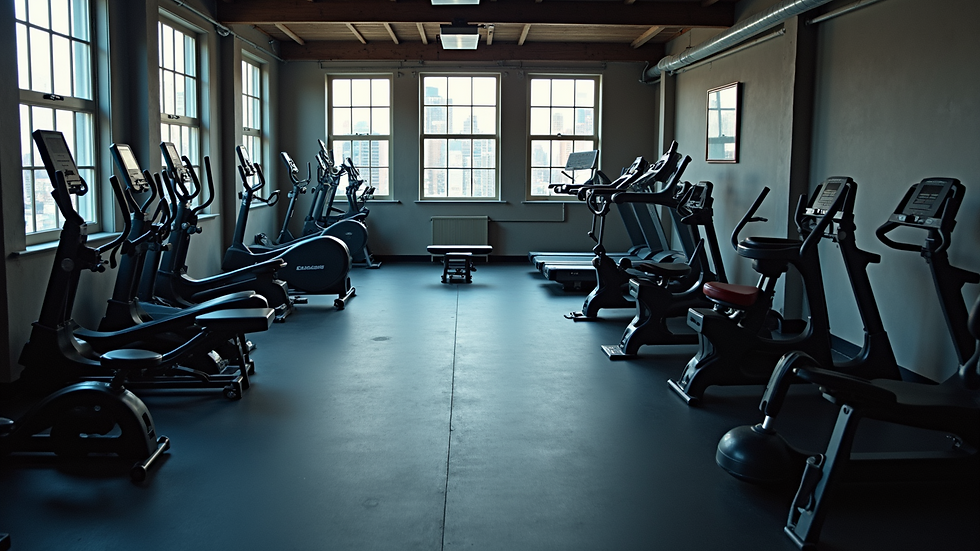The Power of Tailored Routines for Progress
- Kamil Mazur
- Aug 25, 2025
- 3 min read
Creating a routine that fits your unique needs can be the key to unlocking consistent progress in your fitness journey. Generic workout schedules often fail to address individual differences in goals, body types, and lifestyles. Tailored exercise plans, on the other hand, provide a structured yet flexible approach that adapts to your personal circumstances. This blog post explores the power of customized routines and how they can transform your progress.
Why Tailored Exercise Plans Matter
Not all bodies respond the same way to exercise. Factors such as age, fitness level, and health conditions influence how effective a workout is for you. Tailored exercise plans take these variables into account, ensuring that every session is optimized for your success.
For example, someone recovering from an injury will need a different approach than a seasoned athlete. A tailored plan might include low-impact exercises and gradual progression to avoid setbacks. Meanwhile, a beginner might focus on building foundational strength and endurance before moving to advanced routines.
Benefits of tailored exercise plans include:
Increased motivation due to achievable goals
Reduced risk of injury by avoiding unsuitable exercises
Efficient use of time with focused workouts
Better tracking of progress with personalized benchmarks

How to Create Effective Exercise Plans
Designing an effective exercise plan requires understanding your goals and constraints. Here are practical steps to help you build a routine that works:
Define Your Goals
Are you aiming to lose weight, build muscle, improve endurance, or enhance flexibility? Clear goals guide your exercise selection and intensity.
Assess Your Current Fitness Level
Knowing your starting point helps in setting realistic targets and avoiding overtraining.
Choose Suitable Exercises
Select exercises that align with your goals and physical capabilities. For example, strength training for muscle gain or cardio for endurance.
Plan Frequency and Duration
Decide how many days per week you can commit and how long each session will last. Consistency is more important than intensity at the beginning.
Include Rest and Recovery
Rest days are essential for muscle repair and preventing burnout.
Track and Adjust
Monitor your progress and tweak your plan as needed to keep challenging yourself.
For those looking for expert guidance, personalized exercise plans offer a tailored approach designed by professionals to maximize your results.

What is the 3 2 1 Rule in Gym?
The 3 2 1 rule is a simple yet effective guideline to structure your gym workouts for balanced progress. It breaks down your routine into three parts:
3 sets of each exercise
2 minutes of rest between sets
1 minute of high-intensity effort per set
This rule helps maintain intensity while allowing enough recovery to perform each set effectively. It is especially useful for those who want to build strength and endurance without overexerting themselves.
For example, if you are doing squats, you would perform 3 sets, each lasting about 1 minute with proper form, followed by 2 minutes of rest before the next set. This approach keeps your heart rate elevated and muscles engaged, promoting better results.
The 3 2 1 rule can be adapted to various exercises and fitness levels, making it a versatile tool in your workout arsenal.

Incorporating Flexibility and Adaptability in Your Routine
Life is unpredictable, and your exercise plan should be flexible enough to accommodate changes. Whether it’s a busy workweek, travel, or unexpected events, adapting your routine ensures you stay on track without feeling discouraged.
Tips for maintaining flexibility:
Have backup workouts: Shorter or lower-intensity options for busy days.
Mix different types of exercise: Combine strength, cardio, and mobility work to keep things interesting.
Listen to your body: Adjust intensity based on how you feel to prevent injury.
Set micro-goals: Small achievements keep motivation high even when time is limited.
By embracing adaptability, you create a sustainable routine that fits your lifestyle rather than forcing your life to fit the routine.
The Role of Consistency in Progress
Consistency is the foundation of any successful fitness journey. Tailored routines help by making workouts manageable and enjoyable, increasing the likelihood that you will stick with them.
Here are some strategies to build consistency:
Schedule workouts like appointments: Treat them as non-negotiable.
Celebrate small wins: Recognize improvements in strength, endurance, or mood.
Find a workout buddy or community: Social support boosts accountability.
Use technology: Apps and trackers can remind and motivate you.
Remember, progress is not always linear. Some days will be better than others, but consistent effort over time leads to lasting results.
Tailored exercise plans empower you to take control of your fitness journey. By understanding your unique needs and adapting your routine accordingly, you set yourself up for sustainable progress and improved well-being. Whether you follow the 3 2 1 rule or customize your workouts based on your schedule, the key is to stay committed and flexible. Embrace the power of personalized routines and watch your progress unfold.





Comments